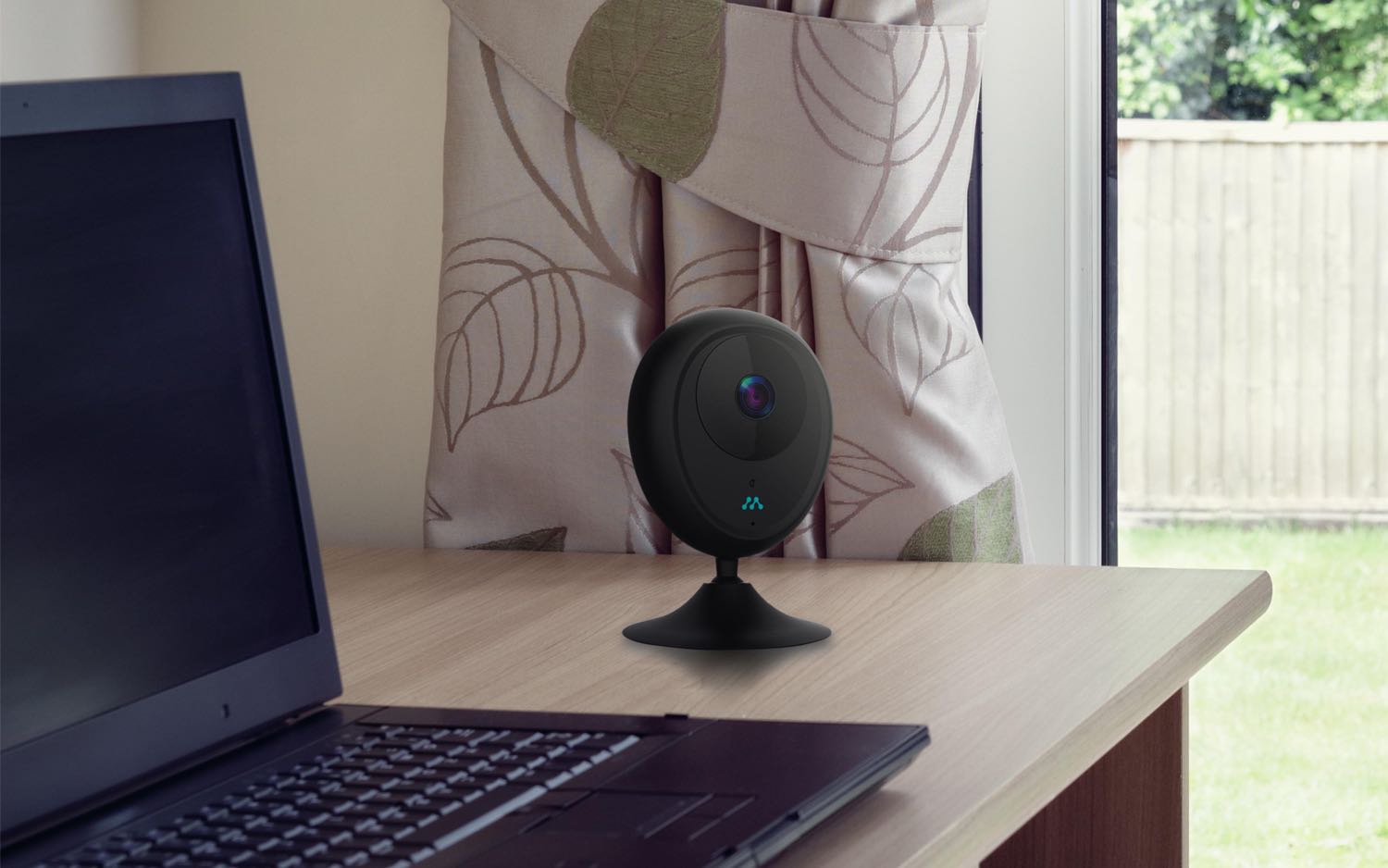Tom's Guide Verdict
The Cori HD Camera's greatest advantage is its low price. But this device also produces pretty good daylight video that's easy to access and save.
Pros
- +
Inexpensive
- +
Simple, easy-to-navigate app
- +
Bright daylight video, with decent facial details
Cons
- -
Low-resolution video
- -
Poor night video
- -
Frequent false alerts
Why you can trust Tom's Guide
The Cori security camera from Momentum is a budget indoor camera, which means it doesn't have the great video resolution or powerful, versatile software that you'd find on much more expensive devices, such as the Arlo Q. However, Cori's price is right — $59 for two cameras — and if all you want is an adequate camera that includes video recording, the Cori may be a good enough choice for you.
Design
The 4.2-inch-tall Cori camera is an understated black device shaped like an inverted teardrop and measuring about 3 x 2.5 x 1.25 inches. It rotates and pivots on its 1-inch x 2.75-inch, round base, so you can easily angle the camera.
The microphone is in the front of the camera, and the speaker is on the back. An uncovered, spring-loaded SD slot on the side accommodates a class-4 microSD card of up to 128GB (which you'll need to buy separately).
An 8-foot USB power cord plugs into the lower back of the camera and into a small, 1.5 x 1.25 x 0.75-inch AC adapter that doesn't obscure adjacent outlets.
MORE: Our Favorite Smart Home Gadgets and Systems
The Cori camera uses WEP, WPA2 and WPA security protocols, and videos are encrypted.
Video and Audio Quality
The Cori's 0.25-inch CMOS sensor and glass lens capture video over a 110-degree field of view. The 720p video resolution is a rarity among security cameras, the vast majority of which now create 1080p video — including our top budget pick, the EZViz Mini O.
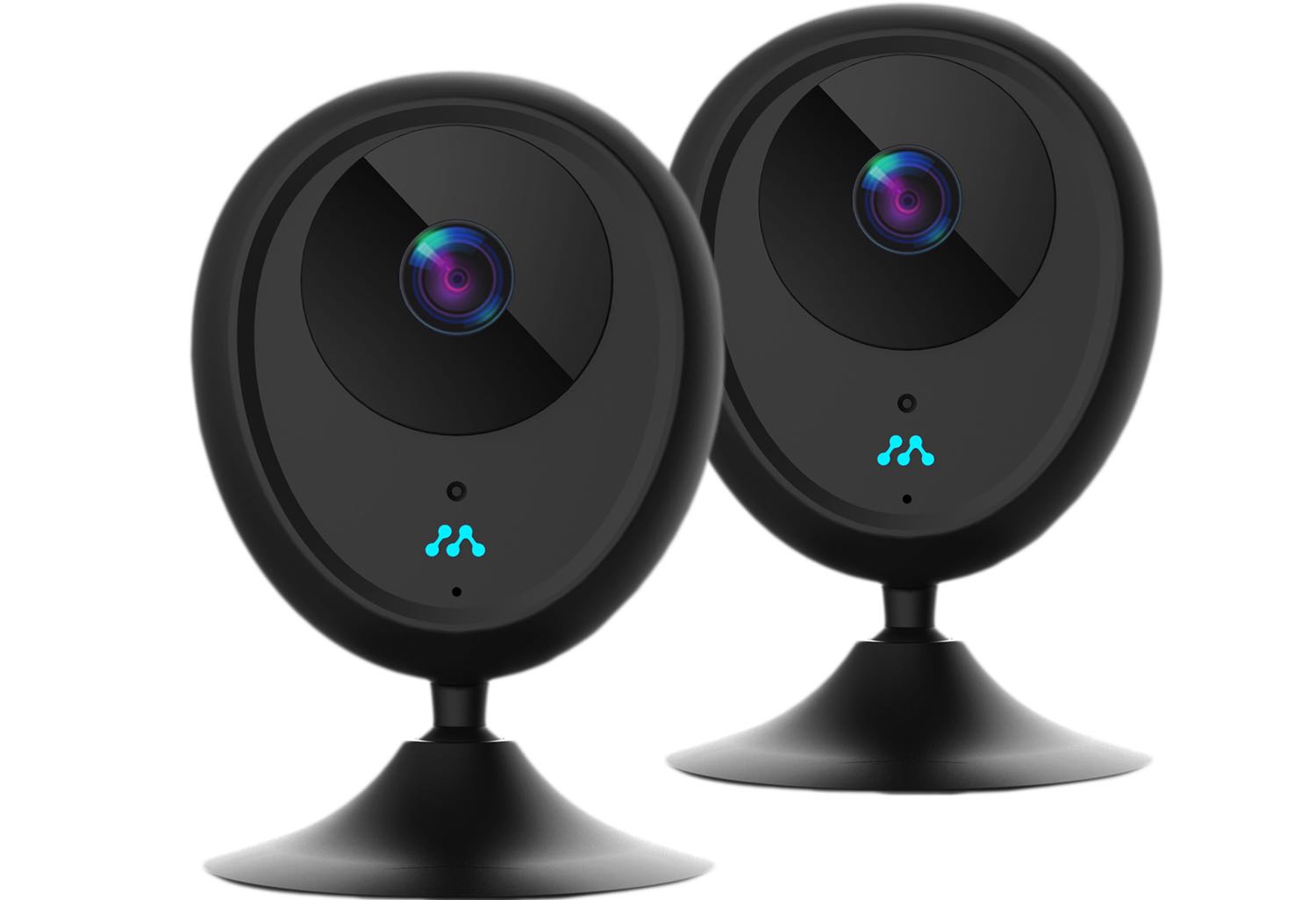
The lack of details is evident in the low-resolution capture of my daylight videos, but the color is good. The high contrast means you lose details in the shadows, but everything in the image, including faces, is clear and bright.
In my night-vision captures, the single 850nm infrared LED did a good job illuminating the entire dark room. However, the 720p video captured little data, resulting in significant blur, including obscured facial details.
Recorded sound is loud and very audible. However, two-way audio is less impressive. When I spoke from a remote phone through the camera to a person in the monitored room, their voice was clear enough, though not loud. Sound was even softer when my conversation partner spoke from the monitored room to the phone; I had to listen carefully to understand what was being said. The two-way audio is half-duplex, which means that each person needs to wait for the other to finish before trying to speak.
Motion & Audio Detection
Out of the box, the Cori doesn't automatically capture video when it detects motion or audio. Instead, you have to set up at least one Rule. Each Rule has check-mark options for the trigger (such as the detection of motion) and the action (send a push notification or record a video). Then, you select which days of the week the Rule will be active; you can add several time periods for each day. It's a straightforward, easy-to-use system. However, you can't name the Rules to help yourself identify them in the resulting list, nor is there an on/off switch for each Rule. And while the camera will record video when sound is detected, as specified by the Rules defined for motion, the app has no audio options in the Rules.
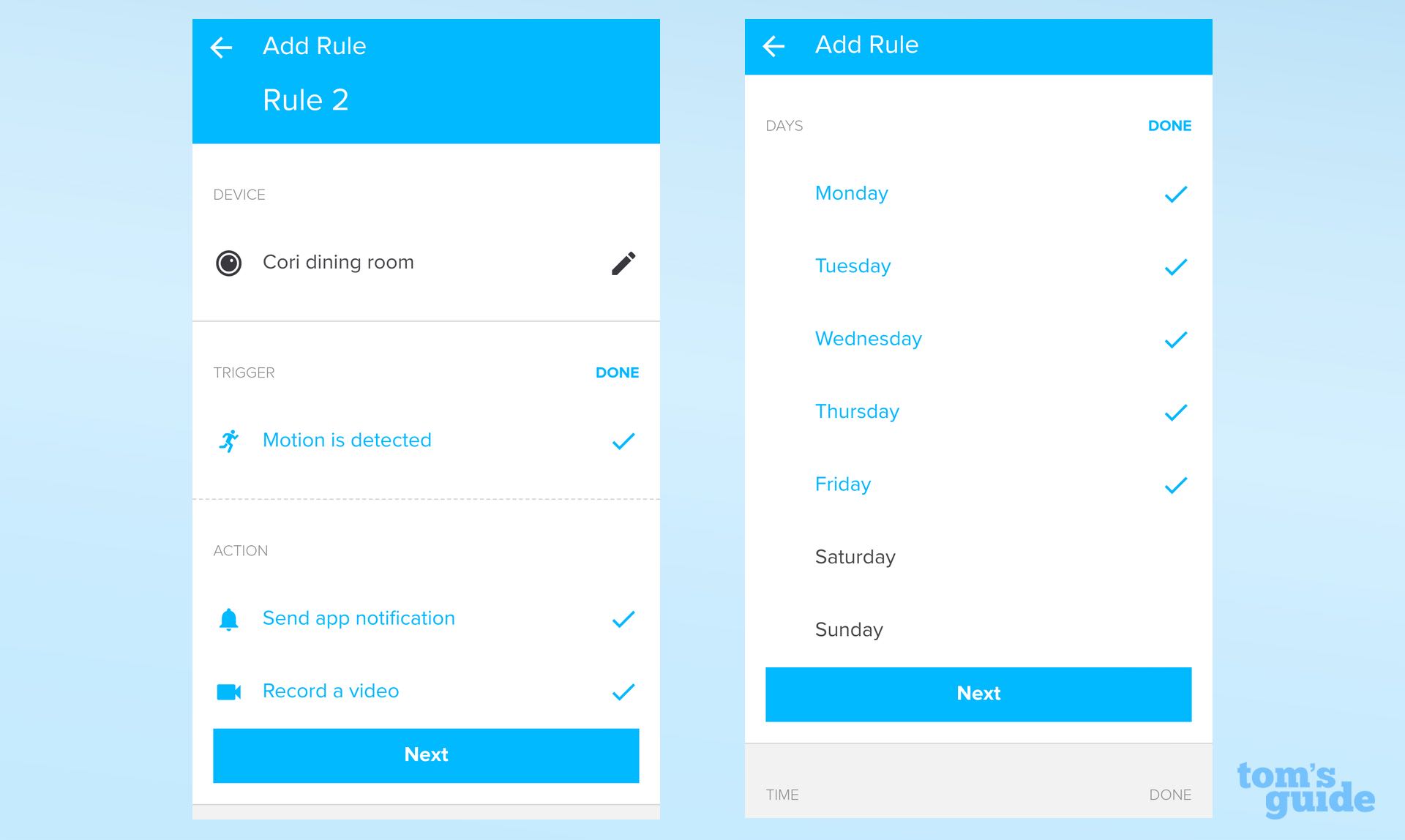
You can further refine motion detection when you create a single motion zone by tapping on squares overlaid on the scene; that turns detection in that area on or off. It's a more tedious operation than what you'll find in other security-camera apps, which instead use either tap-and-drag or polygonal-shapes approaches. What's more, the Cori app has no Rule option to use a zone at certain times of the week or day.
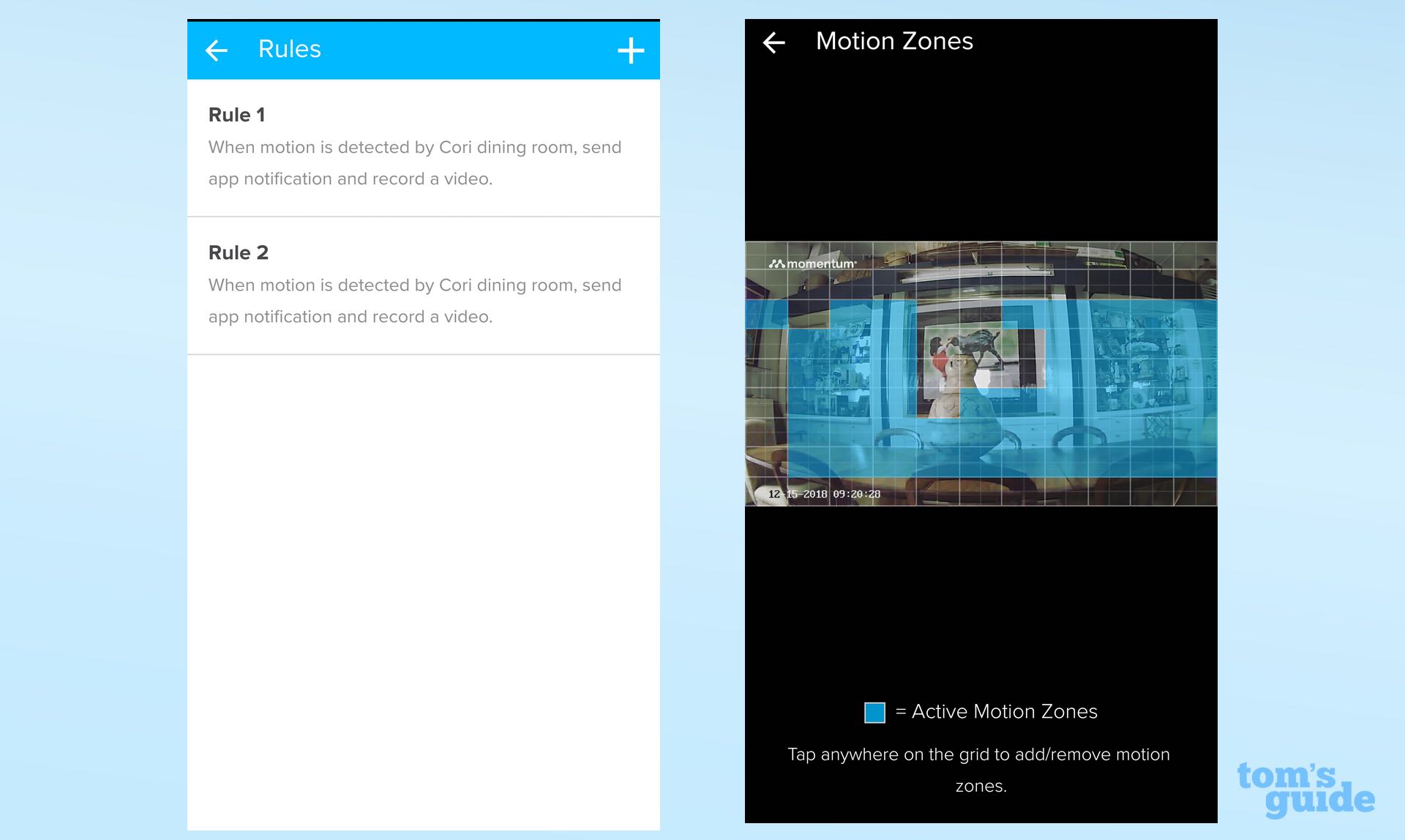
In the Activity list, recorded videos are identified by small square thumbnails, the name of the camera, and the day and time of the recording. You can also filter the list view by camera and the kind of alert. Unfortunately, the square thumbnails give no indication of the triggering motion.
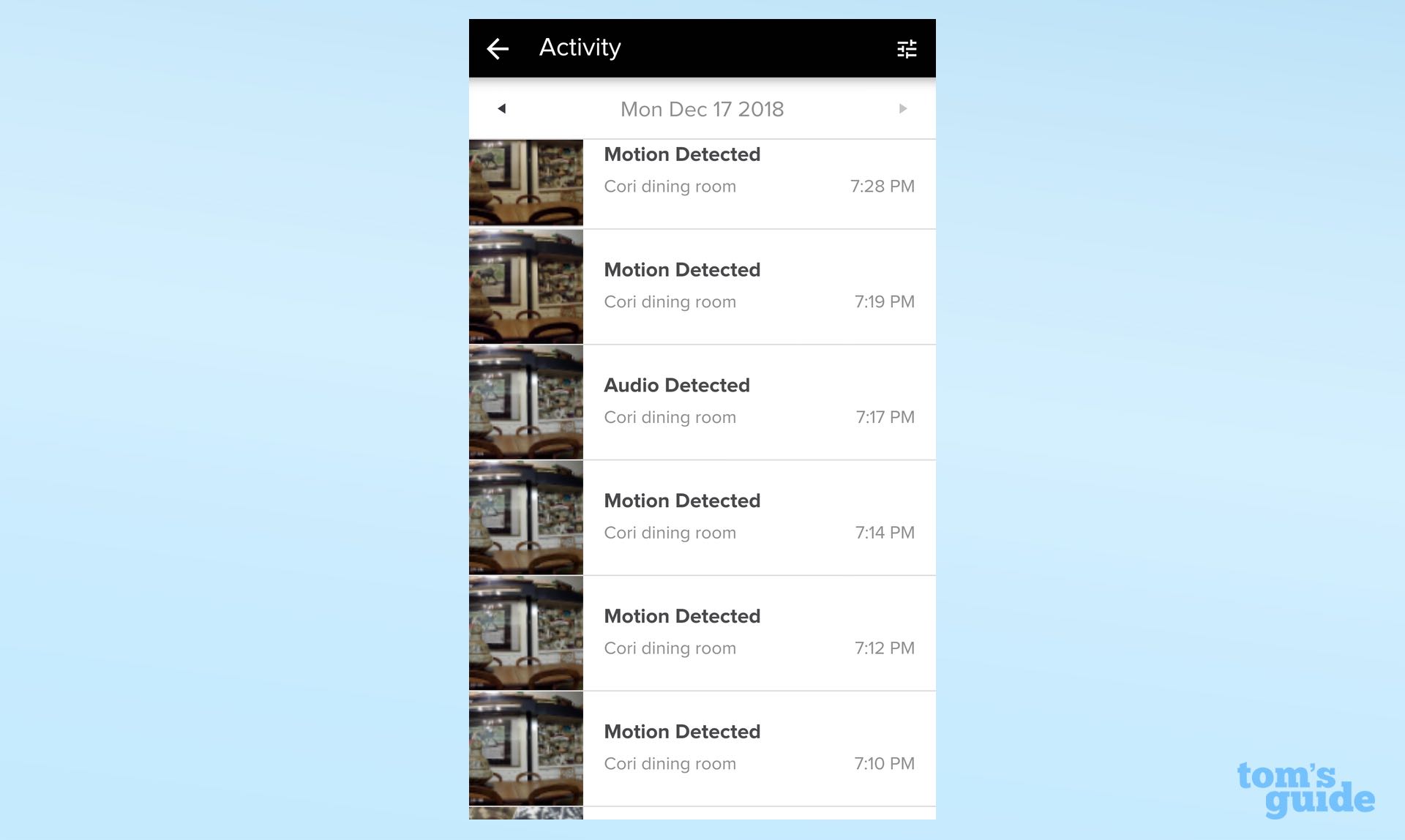
Click on a thumbnail in the Activity list to open a video, which auto-rotates smoothly between horizontal and vertical orientations. A convenient download button will save your video to your phone.
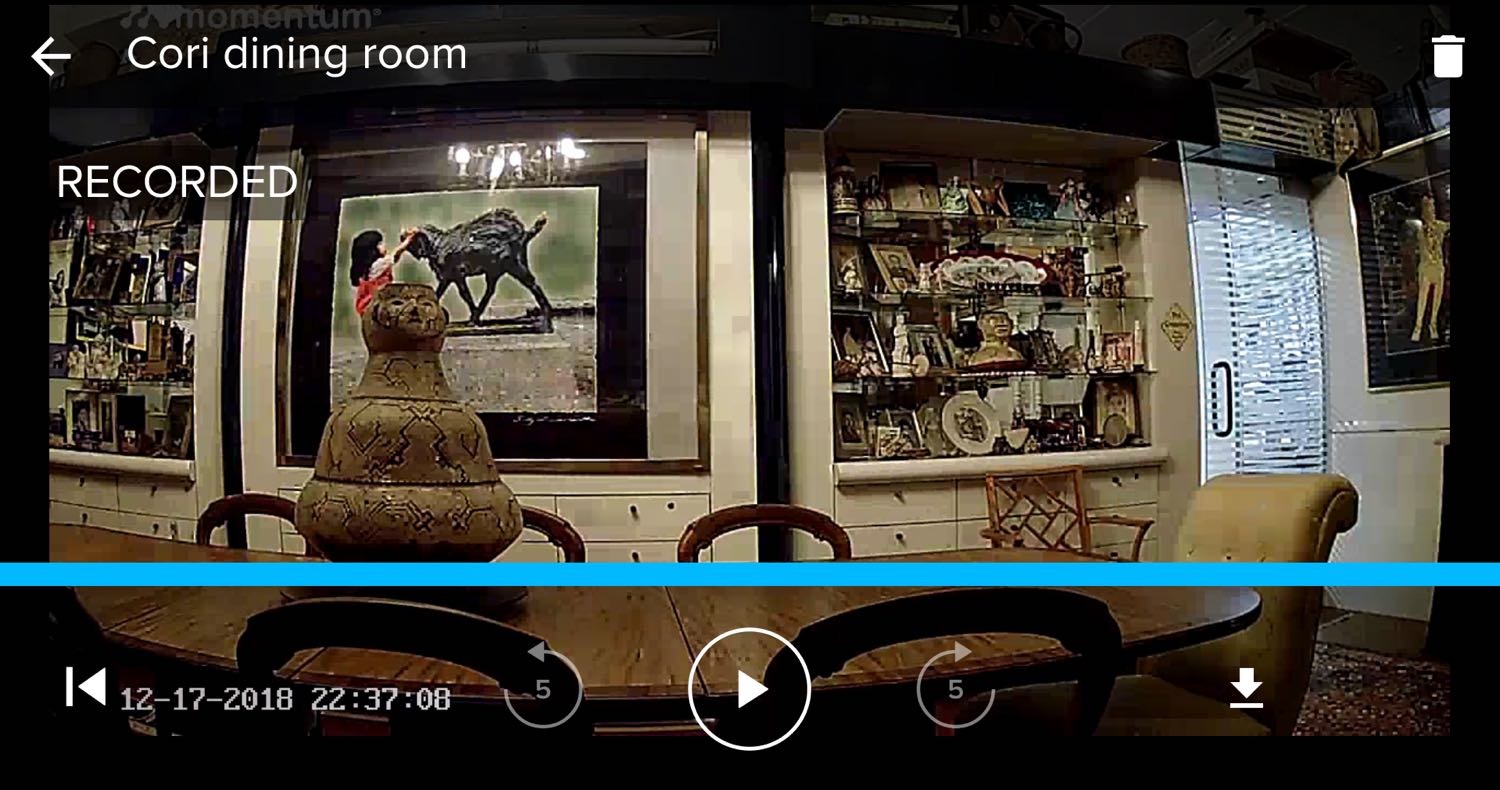
Over the two weeks in which I tested the camera, the Cori initially had a very high percentage of false alerts. A large number of the false-motion alerts appeared to be triggered by image pixelation. In addition, audio alerts triggered video capture when there were no unusual sounds in the room. Setting the motion and audio sensitivity sliders to low significantly reduced the number of false alerts, though they remained frequent.
Cloud Storage
Cori can accommodate a microSD card of up to 128GB for local storage of captured videos. The camera includes a free Lite cloud plan that provides 24 hours of video history.
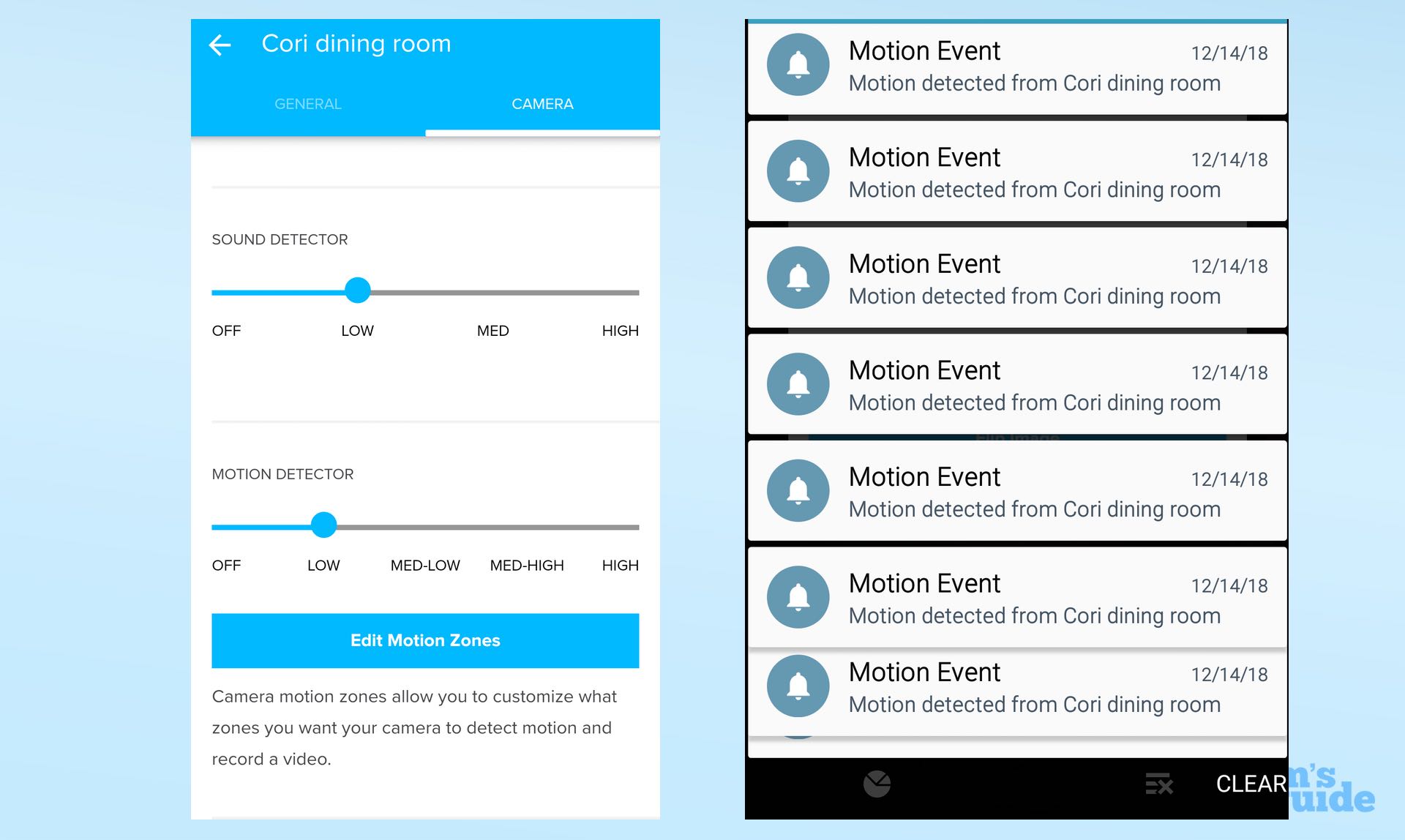
Cori has three paid cloud plans. The Plus plan offers seven-day video history for up to two cameras for $4.99/month or $49.99/year. Premium provides 30-day video history for up to five cameras for $9.99/month or $99.99/year. And the Pro plan covers 60-day video history for up to 10 cameras for $19.99/month or $199.99/year. All paid cloud plans include the first month free.
MORE: Best Wireless (Wi-Fi) Home Security Cameras
That's a bit better than EZViz's plan, which costs $5.99/month per camera, or $59.99/year. A 30-day plan costs $10.99/month per camera, or $109.99/year. EZiz offers no discounts for additional cameras.
Mobile Apps
The Cori mobile app (Android and iOS) is simple, with few options and rather easy navigation. Icons tend to be industry-standard and easy to understand.
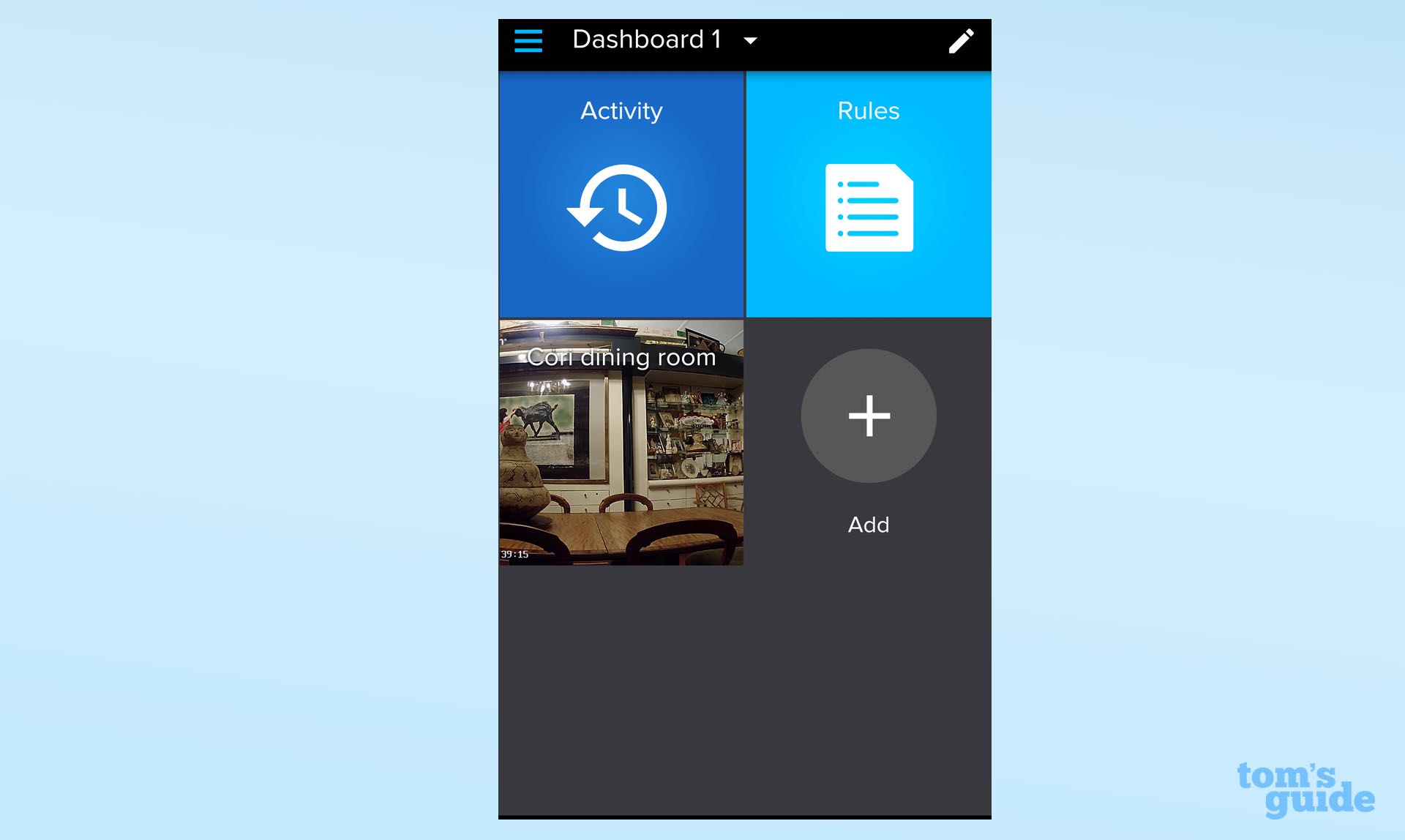
The Live View auto-rotates quickly between horizontal and vertical orientations. The app has the controls for two-way audio, plus icons for taking a snapshot or recording video from the Live View.
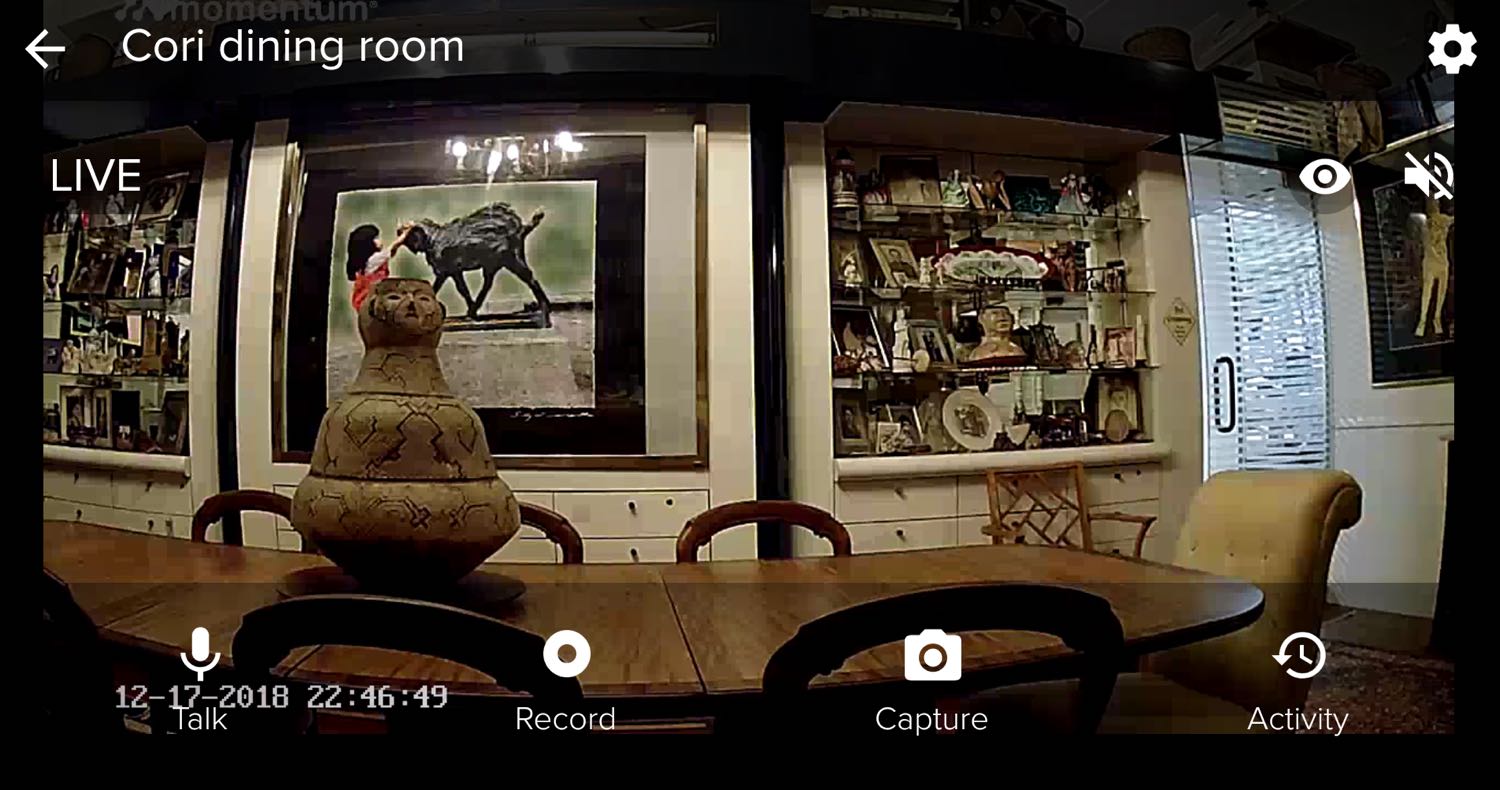
I had difficulty with the installation. Repeated efforts to pair the camera with the Android app failed. Only after pairing the Cori on an iPhone could I access the camera, its videos and its settings on an Android phone. A Momentum spokesperson said they have never heard of this problem.
The Cori has no web portal. (EZViz does have one, but you need to use either Internet Explorer or Safari.)
Smart-Home Integration
Cori is integrated with Google Assistant. At present, you can use Google to turn on the camera; you will soon also be able to turn the device off via Google. Cori has no support for IFTTT.
Bottom Line
The Momentum Cori may fit the bill for consumers who aren't willing to pay up for a top-notch, high-resolution camera that comes with high-powered software — like the Arlo Q, for example. Cori's price is downright cheap, at $59.99 for two cameras. Despite the low cost, the low-resolution daylight video captures good color and enough data to make recognizing faces easy, and Cori offers both local storage of your video and a free, minimal cloud plan.
Among budget security cameras, we still prefer the EZViz Mini O 1080p; it costs about $50 per camera, but compared to the Cori, it offers much better nighttime video, a higher resolution and a flexible scheduling plan. Still, if you're looking for something even cheaper and don't mind a few compromises, the Cori is worth a look.
Specs
| Video resolution | 720p |
| Field of view | 110 degrees |
| Night vision | One 850nm infrared LED |
| Network connectivity | 802.11 b/g/n Wi-Fi connection, 2.4 GHz for setup |
| Smart home connectivity | Google Assistant, though that is currently very limited |
| IFTTT connectivity | None |
| Audio | Half-duplex, two-way audio |
| Mobile devices supported | iOS 10.0 or later, Android 5.0 or later |
| Web browsers supported | N/A, no web portal |
| Cloud storage | Free cloud storage of 24 hours of video. Seven-day video history for up to two cameras costs $4.99/month or $49.99/year. Thirty-day video history for up to five cameras is $9.99/month or $99.99/year. Sixty-day video history for up to 10 cameras is $19.99/month or $199.99/year. All paid cloud plans include the first month free. |
| Local storage | microSD card, class 4, up to 128GB, FAT32 (not included) |
| MSRP | $59 (for two cameras) |
Credit: Tom's Guide
Sally Wiener Grotta is the president and lead analyst of DigitalBenchmarks test lab (www.DigitalBenchmarks.com). The scripts she created for various tech publications for testing and evaluating digital cameras, image quality, software and related technologies have become industry standards. Among her numerous books is the first major volume on image processing “Digital Imaging for Visual Artists” (McGraw-Hill), co-authored with Daniel Grotta. Her hundreds of reviews, stories and columns have appeared in scores of magazines, journals and online publications.
